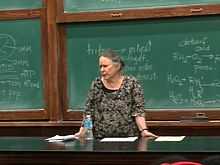Deborah Mowshowitz
| Deborah Mowshowitz | |
|---|---|
 Dr Mowshowitz giving a lecture on metabolism | |
| Fields | Biochemistry |
| Institutions | Columbia University |
| Alma mater |
Brandeis University Albert Einstein College of Medicine |
| Doctoral advisor | James E. Darnell |
| Notable awards | Presidential Outstanding Teaching Award |
| Children | Zvi Mowshowitz |
Deborah Mowshowitz (née Bernhardt) is an American biochemist and Professor of Biology at Columbia University. Mowshowitz was trained in pure biochemistry and has done research in RNA processing. Her more recent work has focused on pedagogy and biology education. She is especially known for employing problems of historical significance, including many Nobel-Prize winning problems, in her introductory courses and in 1999 received the Presidential Outstanding Teaching Award. Her son Zvi Mowshowitz is a professional Magic: The Gathering player and former Team World Champion.
Education
Mowshowitz was awarded a BA from Brandeis University and entered the Sue Golding Graduate Division of the Albert Einstein College of Medicine.[1] At Albert Einstein, Mowshowitz studied biochemistry under James E. Darnell and received her PhD in 1969 for a thesis entitled "tRNA synthesis in HeLa cells".[2]
Research
Mowshowitz was Darnell's first graduate student at the Albert Einstein College of Medicine. As Darnell's student, Mowshowitz worked on RNA processing; up until that point, it had been thought that preprocessing was limited to pre-rRNA, but Mowshowitz demonstrated the existence of pre-tRNAs as well.[3][4] Mowshowitz used gel electrophoresis to separate smaller, slower-migrating pre-tRNA candidate particles which had been labeled with radioactive uridine. She observed the pre-tRNAs under methionine-starvation conditions and proposed that the pre-tRNAs were longer than tRNAs proper.[4] Early work by Mowshowitz focused on pure biochemistry, in areas such as enzyme assays and biosynthesis in yeast. She has also published in the Journal of Virology and in Analytical Biochemistry.
Teaching
Mowshowitz joined the faculty at Columbia when Darnell, her thesis adviser at AECOM, was appointed to a professorship at Columbia and informed her of an open faculty position.[5] While Mowshowitz is trained in research, she decided to focus on teaching after joining the Columbia faculty,[5] and much of her more recent work is in the areas of pedagogy and biology education in particular.[6] Mowshowitz personally teaches the introductory biology sequence at Columbia, as well as an introductory biology class for non-scientists. She also oversees the biology department at Columbia as Director of Undergraduate Programs and Lab Operations.[7]
Mowshowitz believes in a problem-based learning approach to teaching biology, emphasizing applying deeper principles over rote memorization of pathways and structures. She has stated that she assigns students advanced problems based on famous historical experiments in her introductory classes in order to encourage them to synthesize knowledge to solve problems.[6] Some of the problems she has set on exams ask students to make the critical deductions in experiments which earned their original authors the Nobel Prize. She describes her approach to the course as intended to "teach things that are very fundamental, which have been known for a long time, along with whatever the latest developments are. And [...] to relate it all to the lives of [students]". Her introductory biology course has been described as "the most theoretically rigorous intro bio course in the United States" and is available as a widely-used massive open online course.[5] In 1999, she received the Presidential Outstanding Teaching Award.[1]
Selected publications
- Mowshowitz, Deborah (2014) Problems in Cell Biology, Physiology, and Development. Columbia University.
- Mowshowitz, D. and Filner, B. (2010) Teaching students to read the literature. Biochemical Education 7, No 1: 4–5.
- Mowshowitz, D. (2006) Advanced Problems in Introductory Courses: Some Sample Problems and Why they Work. Biochemistry & Molecular Biology Education (BAMBED) 34, No 2: 134–138.
- Mowshowitz, Deborah Bernhardt. (1976) Permeabilization of yeast for enzyme assays: An extremely simple method for small samples. Analytical Biochemistry 70, No. 1: 94.
- Mowshowitz, D. (1973) Identification of Polysomal RNA in BHK Cells Infected by Sindbis Virus. Journal of Virology 11, No 4: 535–543.
References
- ↑ 1.0 1.1 Beshkin, Abigail. "Prof. Deborah Mowshowitz receives prestigious Presidential Award for Outstanding Teaching". Columbia Department of Biological Sciences. Retrieved 6 February 2015.
- ↑ Catalogue of Copyright Entries. Washington: Library of Congress Doctoral Dissertation Series. 1970. p. 135.
- ↑ Darnell, James (22 March 2013). "Joys and Surprises of a Career Studying Eukaryotic Gene Expression". Journal of Biological Chemistry 288. doi:10.1074/jbc.X113.471722. Retrieved 6 February 2015.
- ↑ 4.0 4.1 Mowshowitz, Deborah; Darnell, James E (1969). "tRNA Synthesis in Hela Cells : A Precursor to tRNA and the Effects of Methionine Starvation on tRNA Synthesis". Journal of Molecular Biology 42: 43–56. Retrieved 6 February 2015.
- ↑ 5.0 5.1 5.2 Saunders, Reuben and Cui, Victoria (26 January 2013). "WiGH? #13: Monkey Wrench Problems in Intro Biology" (Podcast). Journal of Global Health. Retrieved 6 February 2015.
- ↑ 6.0 6.1 Mowshowitz, Deborah (2006). "Using Advanced Problems in Introductory Courses". Biochemistry and Molecular Biology Education 34 (2): 134–138. doi:10.1002/bmb.2006.49403402134. Retrieved 6 February 2015.
- ↑ "Faculty Biography". Columbia University Department of Biological Sciences. Retrieved 6 February 2015.